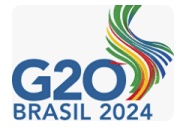Pope Francis’ Messsage at the G20 Leaders Summit[Rio de Janeiro, 18-19 November 2024]
“The Holy See will continue to promote human dignity and make its specific contribution to the common good,
offering the experience and commitment of Catholic institutions throughout the world,
so that in our world no human being, as a person loved by God, be deprived of his or her daily bread”.
I extend warmest greetings to all those attending this G20 Summit in Rio de Janeiro.
It is my sincere hope that the discussions and outcomes of this event will contribute to the promotion of a better world and a prosperous future for generations to come.
As I wrote in my Encyclical Letter Fratelli Tutti,
“Politics must make the effective elimination of hunger one of its primary goals.
Indeed, ‘when financial speculation manipulates the price of food, treating it as just another commodity, millions of people suffer and die from hunger.
At the same time, tons of food are thrown away.
This is a real scandal. Hunger is a crime; food is an inalienable right. Often, while we continue our semantic or ideological disputes, we allow our brothers and sisters to die of hunger and thirst (189).
However, in the context of a globalized world facing a multitude of interrelated challenges, it is essential to recognize the significant pressures currently being exerted on the international system. These pressures manifest themselves in various forms, including the intensification of wars and conflicts, terrorist activities, assertive foreign policies and acts of aggression, and the persistence of injustices.
It is therefore of the utmost importance that the Group of 20 finds new ways to achieve a stable and lasting peace in all areas of conflict, with the aim of restoring the dignity of those affected.
Today’s armed conflicts are not only responsible for a significant number of deaths, mass displacement and environmental degradation; they also contribute to increased hunger and poverty, both directly in the affected areas and indirectly in countries hundreds or thousands of miles away from the conflict zones, in particular through the disruption of supply chains. Wars continue to be a major drain on national economies, particularly because of the exorbitant amounts of money spent on weapons and armaments.
There is also a significant paradox in terms of access to food.
On the one hand, more than 3 billion people do not have access to a nutritious diet.
On the other hand, almost 2 billion people are overweight or obese due to poor diets and sedentary lifestyles.
This requires a concerted effort to actively engage in change at all levels and to reorganize food systems as a whole, and it is a matter of grave concern that society has not yet found a way to address the tragic situation of those facing hunger.
The silent acceptance of hunger by human society is a scandalous injustice and a grave offence.
Those who, through usury and greed, cause the starvation and death of their brothers and sisters in the human family are indirectly committing a homicide which is imputable to them.
No effort should be spared to free people from poverty and hunger.
It is important to remember that the issue of hunger is not simply a matter of inadequate food, but rather a consequence of wider social and economic injustices.
Poverty, in particular, is a major contributor to hunger. Poverty is perpetuating a cycle of economic and social inequality that is pervasive in our global society.
The relationship between hunger and poverty is inextricably linked.
It is clear, therefore, that immediate and decisive action must be taken to eradicate the scourge of hunger and poverty. Such action must be taken in a collective and cooperative manner, involving the entire international community.
The implementation of effective measures requires the concrete commitment of governments, international organizations and society as a whole.
The centrality of the God-given human dignity of every individual, access to basic goods and the equitable distribution of resources must be prioritized in all political and social agendas.
Furthermore, the eradication of malnutrition cannot be achieved by simply increasing global food production. In fact, there is already enough food to feed everyone on the planet; it is just unequally distributed. It is therefore essential to recognize the significant amount of food that is wasted on a daily basis. Tackling food waste is a challenge that requires collective action.
In this way, resources can be redirected towards investments that help the poor and hungry meet their basic needs.
It is also necessary to implement food systems that are environmentally sustainable and beneficial to local communities.
It is clear that an integrated, comprehensive and multilateral approach is essential to address these challenges. Given the scale and geographical scope of the problem, short-term solutions are not enough.
A long-term vision and strategy are needed to tackle malnutrition effectively. Sustained and consistent commitment is essential to achieve this goal and must not be dependent on immediate circumstances.
In this sense, it is my hope that the Global Alliance Against Hunger and Poverty can have a significant impact on global efforts to combat hunger and poverty.
The Alliance could begin by implementing the Holy See’s long-standing proposal to redirect funds currently spent on arms and other military expenditures into a global fund to fight hunger and promote development in the most impoverished countries.
This approach would help to prevent the citizens of these countries from having to resort to violent or illusory solutions, or from leaving their countries in search of a more dignified life.
It is imperative to recognize that the failure of society’s collective responsibilities towards the poor should not result in the transformation or revision of the original goals into programs which, instead of addressing the real needs of people, ignore them. In these efforts, local communities and the cultural and traditional wealth of peoples must not be ignored or destroyed in the name of a narrow and short-sighted concept of progress.
In reality, this would risk becoming synonymous with ‘ideological colonization’.
In this sense, interventions and projects should be planned and implemented in response to the needs of people and their communities, and not imposed from above or by entities seeking only their own interests or profits.
For its part, the Holy See will continue to promote human dignity and to make its specific contribution to the common good, offering the experience and commitment of Catholic institutions throughout the world, so that in our world no human being, as a person loved by God, be deprived of his or her daily bread.
May Almighty God abundantly bless your works and efforts for the genuine progress of the entire human family.
From the Vatican, 18 November 2024
FRANCIS


